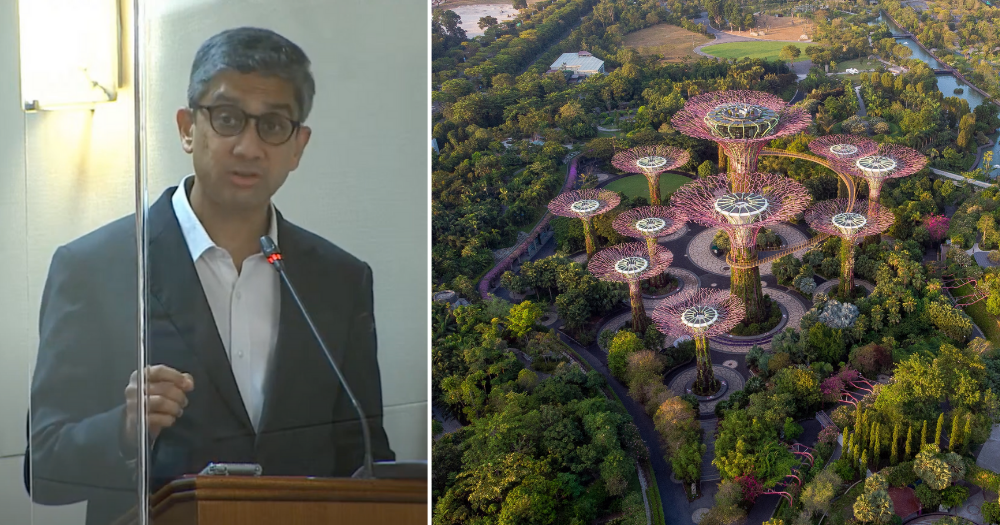Follow us on Telegram for the latest updates: https://t.me/mothershipsg
Singapore could become a role model for other countries by showing we can achieve both economic development and environmental sustainability, Workers' Party's Leon Perera said in Parliament.
In Perera's speech made on Feb. 1, he reiterated the importance of declaring a climate emergency, noting that climate change was an issue that would affect everyone on all rungs of the social ladders.
"The climate crisis is an emergency. Before we act, we must acknowledge the serious consequences of NOT acting. The hour has come for Singapore to call a spade a spade and join the over 30 other countries in the world who have declared climate emergencies.
The word emergency signifies several things. One is the seriousness of the crisis. But another is the fact that this is a crisis that will deeply affect the nation as a whole and every person in it — rich and poor, fortunate and unfortunate, well-educated and not. An emergency calls for all hands on deck."
He then highlighted three broad principles that can guide Singapore to "master the intersection between economic development and environmental sustainability".
1. Placing people in the center
Climate change will exacerbate existing inequalities.
Its effects will disproportionately affect and be borne by "those of lesser means", Perera said.
For example, rising temperatures can impact those who are unable to afford air-conditioning.
In the Singapore context, Perera pointed out that extensively built areas like Woodlands, Serangoon, Geylang, Sengkang and Punggol can be particularly vulnerable to the sweltering effects of urban heat island.
"The risk is much higher for low-income residents and other people who live and work in these regions because many do not have the options for adaptation: no air-conditioning; shift workers who have to sleep during the hotter day-time; and older people of lesser means who are at higher risk of heat stroke. Moreover, less living space per resident means hotter rooms."
Perera suggested the need for "progressivity" in policies, such as utilising new innovations like anti-solar paint on HDB blocks for lower-income residents.
Perera, citing fellow WP MP Jamus Lim's speech on carbon taxes, proposed redistributing the revenues from carbon taxes to lower income families to cushion the impact of the taxes on the cost of living.
Following up on the recent buzz over conserving mature forests like the Dover forest, Perera questioned if more land should be devoted to golf courses.
This is considering that golf courses currently occupy around 1,500ha of land.
This was also echoed in Parliament by MP Rachel Ong who proposed to rezone Clementi and Dover forests as nature reserves and to redevelop portions of golf courses before touching forested lands.
2. Greater transparency and consultation
In his second point, Perera brought up the importance of transparency "as a powerful ally" which can facilitate public debate.
He suggested stronger incentives and disincentives for sustainability reporting by SGX companies, as well as making sure companies report according to the same, specific guidelines.
Making environmental impact assessments (EIAs) mandatory for all major projects was also a change Perera proposed.
Noting that there have been mature forests cleared previously "that could have possibly failed EIAs", Perera cited the example of Tengah forest, for which the environmental baseline study was not disclosed by HDB.
As EIA consultants are currently hired by developers, Perera also suggested an independent regulatory body to carry out the EIA instead.
3. Preparing for a long-term "Green vision"
As Singapore moves towards a greener future, more needs to be done to support "sunrise", green sectors in the economy in fields such as urban farming, green financing, solar installation and maintenance, and electric vehicles, just to name a few.
The government should thus facilitate the growth of these businesses by "providing incentive support".
A proper plan for "sunset sectors" like fossil fuel industries and traditional car workshop activities to transition to greener, sunrise sectors should also be implemented.
Perera also highlighted the importance of conserving mature core forests and mangroves instead of converting them into nature parks.
Trails through peripheral and less mature forests can also be implemented to further reduce the impact of development to mature forests.
Not only can this be valuable for public and educational recreation, but could boost eco-tourism as well.
Additionally, Perera urged for more stringent national targets to be set — this includes a roadmap of carbon emission reduction and carbon neutrality targets to decarbonise the public sector.
Related stories
Totally unrelated but follow and listen to our podcast here
Top photo from MCI Singapore / YouTube and Unsplash
If you like what you read, follow us on Facebook, Instagram, Twitter and Telegram to get the latest updates.
